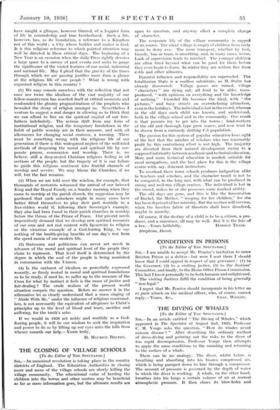THE CLOSING OF VILLAGE SCHOOLS [To the Editor of THE
SPECTATOR.]
.Sia,—An unnoticed revolution is taking place in the country districts of England. The Education Authorities in closing more and more of the village schools are slowly killing the village community. The educational value of herding the children into the towns and other centres may be beneficial as far as mere information goes, but the ultimate results are
open to question, and anyway effect a complete change of character.
The corporate life of the village community is sapped at its source. The silent village is empty of children from early morn to dewy eve. The mere transport, whether by foot, bicycle, 'bus or tram, is unsettling, and, in many eases, worse. Lack of supervision leads to mischief. The younger children are often tired beyond what can be good for them before they even begin to learn. In winter they are seldom free from colds and other ailments.
Parental influence and responsibility are superseded. The totalitarian State is a soulless substitute, as M. Stalin has already discovered. Village games are ruined. village " characters " are dying out, all tend to be alike, mass- produced, " with opinions on everything and the knowledge of nothing." Crowded life becomes the ideal, with " the pictures," and busy streets an overwhelming attraction, even in the holidays. The individual is lost in the crowd, whereas in the old days each child was known, and understood, both in the village school and in the community. One result is that parents try to get into the towns ; land-workers of the old and thorough type grow scarce, and now tend to be drawn from a curiously drifting C.3 population.
The passion for this system of popular education loses sight of the fact that the number of scholars who can reasonably profit by this centralising effort is not high. The majority are diverted from their natural development owing to a supposed inferiority between academic and technical education. More and more technical education is needed, suitable for rural occupations, and the best place for this is the village centre with, say, itinerant instructors.
To overload these town schools produces indigestion alike in teachers and scholars, and the character result is not to be compared, in the long run, with what can be produced in strong and well-run village centres. The individual is lost in the crowd, unless he or she possesses some marked ability.
The old days arc gone, and this is like the lamentation of Rachel, the Mother, " weeping for her children," for she has been deprived of her ministry. But the mother will survive, when the baseless fabric of theorists shall have dissolved, maybe in anarchy.
Of course, if the destiny of a child is to be a citizen, a pro- ducer, and a consumer, all may be well. But it is the fate of










































 Previous page
Previous page